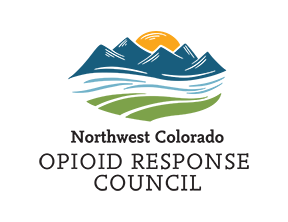Expressions of Interest (EOIs) are now closed.
Thank you to everyone who submitted an Expression of Interest and participated in the community presentations. We’re grateful for the strong engagement and thoughtful proposals shared throughout the process.
NWCOR is now reviewing all submitted EOIs and the input gathered from the community presentations. Selected applicants will be invited to submit a full Request for Proposal (RFP) in the next phase of the funding process.
Please check back soon for updates on next steps.
For any questions, feel free to contact us at [email protected]
Background
The Northwest Colorado Opioid Response Council (NWCOR), also known as the Colorado Region 1 Opioid Abatement Council, representing Jackson, Moffat, Rio Blanco, Grand, and Routt Counties, is dedicated to addressing the impacts of the opioid crisis in our region. NWCOR funding and requirements are guided by the Colorado Opioid Settlement Memorandum of Understanding, the national opioid settlement agreement, and its approved uses.
Through collaborative efforts, we aim to create lasting solutions and foster resilience in the fight against opioid misuse. The NWCOR 2025-2026 priorities focus on developing and sustaining programs that enhance prevention, recovery resources, and workforce development opportunities related to opioid use disorder (OUD) throughout the Northwest Colorado region. Emphasis is placed on ensuring equitable access to these services, particularly in underserved communities, through evidence-based and community-driven strategies.
TIMELINE
| Date | Milestone |
|---|---|
| April 25 | Open Expression of Interest Form |
| June 30 | Expression of Interest Form Due |
| June | Council to review Expressions of Interest & Invite Community Presentations |
| July – August | Community Presentations to Council, Council to Invite Formal Proposals |
| September | Vendor Selection & Award |
NWCOR has prioritized the following strategies for 2025:
- The goal of this work is to support planning in two key areas:
- Community Prevention Planning: Develop a data-informed, community-driven strategy addressing opioid prevention for all residents within the five-county NWCOR region.
- Youth Prevention Planning: Design an evidence-based prevention strategy for school-aged youth targeting school-aged youth (birth – 21), regardless of school enrollment status.
- The goal is to implement evidence-based, community-driven strategies that align with NWCOR priorities, including:
- Expanding recovery housing
- Supporting peer services
- Providing wraparound services
- Increasing Medications for Addiction Treatment (MAT and promoting stigma reduction and community outreach.
- The goal of this work is to expand and sustain access to care by strengthening the clinical and provider workforce—including clinicians, providers, and peer support professionals—through evidence-based training, recruitment, retention, and sustainable funding.
